系动词用法的详细归纳
英语系动词的归类用法
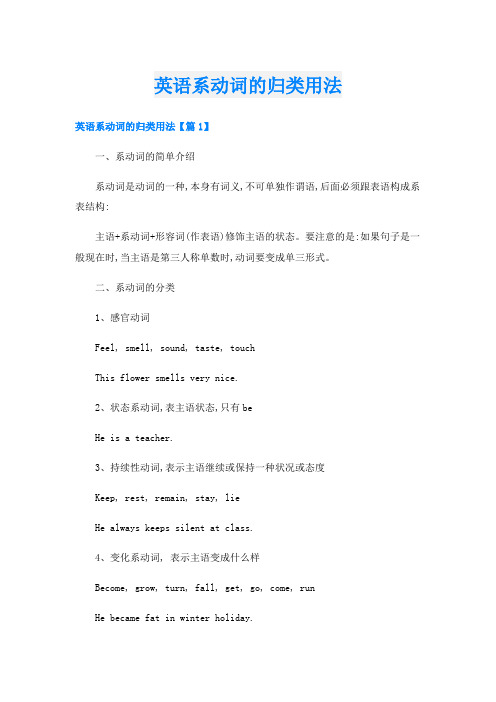
英语系动词的归类用法英语系动词的归类用法【篇1】一、系动词的简单介绍系动词是动词的一种,本身有词义,不可单独作谓语,后面必须跟表语构成系表结构:主语+系动词+形容词(作表语)修饰主语的状态。
要注意的是:如果句子是一般现在时,当主语是第三人称单数时,动词要变成单三形式。
二、系动词的分类1、感官动词Feel, smell, sound, taste, touchThis flower smells very nice.2、状态系动词,表主语状态,只有beHe is a teacher.3、持续性动词,表示主语继续或保持一种状况或态度Keep, rest, remain, stay, lieHe always keeps silent at class.4、变化系动词, 表示主语变成什么样Become, grow, turn, fall, get, go, come, runHe became fat in winter holiday.其实很多系动词可以当系动词,也可以当实义动词,但用法有所不同。
如:LookLook at my hand 实义动词,看She looks amazing.系动词三、下面举例几道题来看Some food isnt good for us, but it good.A. tastesB. eatsC. soundsD. taste解析:根据句意,食物是尝起来,所以用动词taste。
这里主语是it,第三人称单数,所以用tastes,先A.The moon cake tastes▁▁▁▁▁; it sells▁▁▁▁▁.A. good; wellB. good; goodC. well; wellD. well; good解析:taste系动词;sell实义动词。
taste后要加形容词作表语,修饰月饼。
而sell后加副词修饰sell本身。
所以taste +good; sell +well.本题选A.I really enjoy the noodles and vegetables. They ▁▁▁▁▁delicious.A. stayB. feelC. tasteD. sound解析:本题根据句意来。
[小学]系动词的分类及用法大全
![[小学]系动词的分类及用法大全](https://img.taocdn.com/s3/m/9806cd0a58eef8c75fbfc77da26925c52cc5912d.png)
系动词的分类及用法大全系动词系动词亦称联系动词(Link Verb),作为系动词,它本身有词义,但不能单独用作谓语,后边必须跟表语(亦称补语),构成系表结构说明主语的状况、性质、特征等情况。
说明:有些系动词又是实义动词,该动词表达实义时,有词义,可单独作谓语,例如:He fell ill yesterday.他昨天病了。
(fell是系动词,后跟补足语,说明主语情况。
)He fell off the ladder.他从梯子上摔下来。
fell是实义动词,单独作谓语。
1)状态系动词用来表示主语状态,只有be一词,例如:He is a teacher. 他是一名教师。
(is与补足语一起说明主语的身份。
)2)持续系动词用来表示主语继续或保持一种状况或态度,主要有keep, rest, remain, stay, lie, stand, 例如:He always kept silent at meeting. 他开会时总保持沉默。
This matter rests a mystery. 此事仍是一个谜。
3)表像系动词用来表示"看起来像"这一概念,主要有seem, appear, look, 例如:He looks tired. 他看起来很累。
He seems (to be) very sad. 他看起来很伤心。
4)感官系动词感官系动词主要有feel, smell, sound, taste, 例如:This kind of cloth feels very soft.这种布手感很软。
This flower smells very sweet.这朵花闻起来很香。
5)变化系动词这些系动词表示主语变成什么样,变化系动词主要有become, grow, turn, fall, get, go, come, run.例如:He became mad after that. 自那之后,他疯了。
She grew rich within a short time. 她没多长时间就富了。
英语系动词的用法
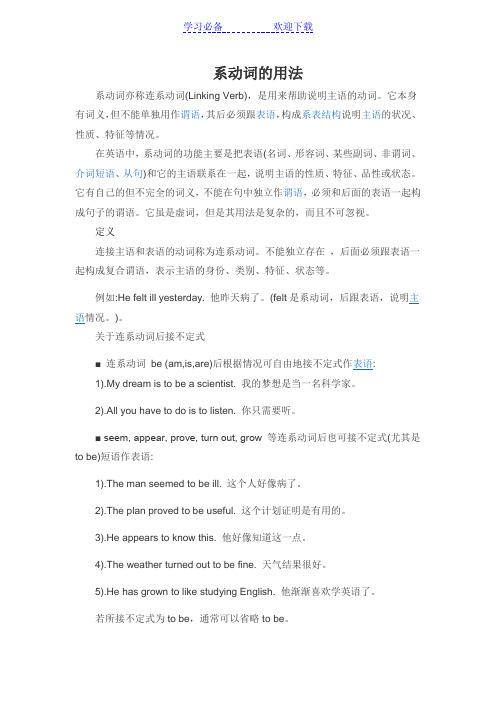
系动词的用法系动词亦称连系动词(Linking Verb),是用来帮助说明主语的动词。
它本身有词义,但不能单独用作谓语,其后必须跟表语,构成系表结构说明主语的状况、性质、特征等情况。
在英语中,系动词的功能主要是把表语(名词、形容词、某些副词、非谓词、介词短语、从句)和它的主语联系在一起,说明主语的性质、特征、品性或状态。
它有自己的但不完全的词义,不能在句中独立作谓语,必须和后面的表语一起构成句子的谓语。
它虽是虚词,但是其用法是复杂的,而且不可忽视。
定义连接主语和表语的动词称为连系动词。
不能独立存在,后面必须跟表语一起构成复合谓语,表示主语的身份、类别、特征、状态等。
例如:He felt ill yesterday. 他昨天病了。
(felt是系动词,后跟表语,说明主语情况。
)。
关于连系动词后接不定式■ 连系动词be (am,is,are)后根据情况可自由地接不定式作表语:1).My dream is to be a scientist. 我的梦想是当一名科学家。
2).All you have to do is to listen. 你只需要听。
■ seem, appear, prove, turn out, grow 等连系动词后也可接不定式(尤其是to be)短语作表语:1).The man seemed to be ill. 这个人好像病了。
2).The plan proved to be useful. 这个计划证明是有用的。
3).He appears to know this. 他好像知道这一点。
4).The weather turned out to be fine. 天气结果很好。
5).He has grown to like studying English. 他渐渐喜欢学英语了。
若所接不定式为to be,通常可以省略to be。
■ sound, smell, feel, taste, become 等连系动词后通常不能接不定式:(也可以理解为用主动表被动)误:These oranges taste to be good. (应去掉to be)误:The roses smell to be nice. (应去掉to be)连系动词look后有时也可接to be,但以省略to be为多。
常用系动词总结

常用系动词总结系动词是一类功能词,用于连接主语和谓语,表示某种状态、特性或属性。
常见的系动词包括be动词(am, is, are, was, were等)、seem、appear、feel、sound、look等。
以下是常用的系动词及其用法总结:1. Be动词(am, is, are, was, were等):Be动词是最常用的系动词,它表示主语和谓语之间的等同关系,并刻画主语的状态或特征。
be动词有多种形式,根据不同的时态和人称而变化。
例如:I am a student.(我是一名学生。
)He is tall and handsome.(他又高又帅。
)They were happy to see us.(他们见到我们很高兴。
)2. Seem:Seem指的是主语给人的印象或感觉,有些时候并不一定是真实的状态,通常用于描述主语的表面特征。
例如:She seems tired.(她看起来很累。
)The food seems delicious.(这个食物看起来很美味。
)3. Appear:Appear表示主语的外表或表现,但有时也会控诉主语的内在特征。
一般与look连用。
4. Feel:Feel表示主语的感受或感觉。
5. Sound:Sound指的是声音的特征,表示主语听起来是什么样子。
6. Look:Look表示主语的外貌或状态,一般用于形容人、事、物的视觉形态。
以上就是常用的系动词及其用法总结。
需要注意的是,系动词通常与形容词和名词连用,来描述主语的状态、特性或属性。
系动词的用法总结和练习题
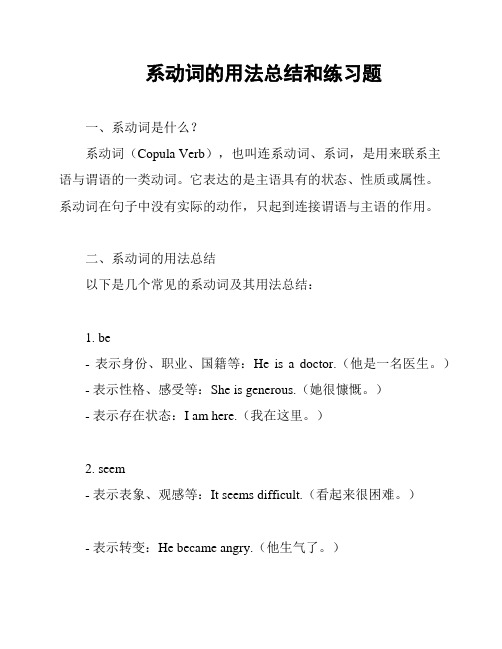
系动词的用法总结和练习题一、系动词是什么?系动词(Copula Verb),也叫连系动词、系词,是用来联系主语与谓语的一类动词。
它表达的是主语具有的状态、性质或属性。
系动词在句子中没有实际的动作,只起到连接谓语与主语的作用。
二、系动词的用法总结以下是几个常见的系动词及其用法总结:1. be- 表示身份、职业、国籍等:He is a doctor.(他是一名医生。
)- 表示性格、感受等:She is generous.(她很慷慨。
)- 表示存在状态:I am here.(我在这里。
)2. seem- 表示表象、观感等:It seems difficult.(看起来很困难。
)- 表示转变:He became angry.(他生气了。
)4. feel- 表示感觉:I feel tired.(我感到疲倦。
)5. look- 表示外观、样子等:She looks beautiful.(她看起来很漂亮。
)6. sound- 表示听觉感受:It sounds nice.(听起来不错。
)7. taste- 表示味道:It tastes delicious.(尝起来很美味。
)8. smell- 表示气味:The flowers smell sweet.(花香四溢。
)三、系动词练题根据上述系动词的用法总结,完成以下练题:1. 请用合适的系动词填空:- The soup ___________ salty.- They ___________ happy after winning the game.- She ___________ tired after a long day.2. 请将以下句子中的系动词找出来:- The book looks interesting.- John is a teacher.- The movie seemed boring at first.参考答案:1. tastes, are, feels2. looks, is, seemed以上是对系动词的用法总结和练习题的文档。
系动词知识点总结
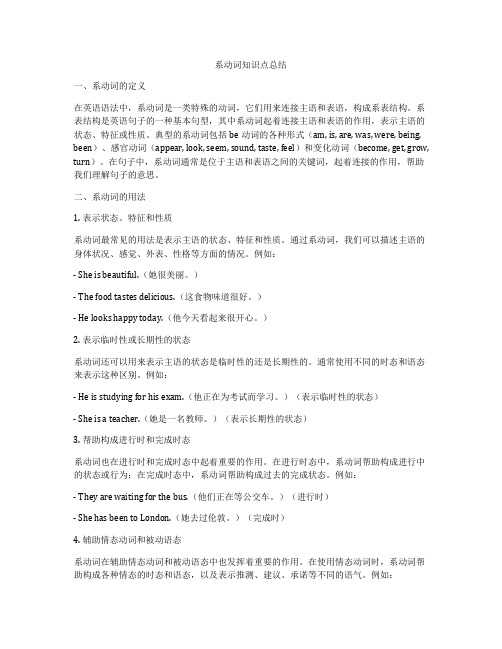
系动词知识点总结一、系动词的定义在英语语法中,系动词是一类特殊的动词,它们用来连接主语和表语,构成系表结构。
系表结构是英语句子的一种基本句型,其中系动词起着连接主语和表语的作用,表示主语的状态、特征或性质。
典型的系动词包括be动词的各种形式(am, is, are, was, were, being, been)、感官动词(appear, look, seem, sound, taste, feel)和变化动词(become, get, grow, turn)。
在句子中,系动词通常是位于主语和表语之间的关键词,起着连接的作用,帮助我们理解句子的意思。
二、系动词的用法1. 表示状态、特征和性质系动词最常见的用法是表示主语的状态、特征和性质。
通过系动词,我们可以描述主语的身体状况、感觉、外表、性格等方面的情况。
例如:- She is beautiful.(她很美丽。
)- The food tastes delicious.(这食物味道很好。
)- He looks happy today.(他今天看起来很开心。
)2. 表示临时性或长期性的状态系动词还可以用来表示主语的状态是临时性的还是长期性的。
通常使用不同的时态和语态来表示这种区别。
例如:- He is studying for his exam.(他正在为考试而学习。
)(表示临时性的状态)- She is a teacher.(她是一名教师。
)(表示长期性的状态)3. 帮助构成进行时和完成时态系动词也在进行时和完成时态中起着重要的作用。
在进行时态中,系动词帮助构成进行中的状态或行为;在完成时态中,系动词帮助构成过去的完成状态。
例如:- They are waiting for the bus.(他们正在等公交车。
)(进行时)- She has been to London.(她去过伦敦。
)(完成时)4. 辅助情态动词和被动语态系动词在辅助情态动词和被动语态中也发挥着重要的作用。
系动词后面接什么词 用法有哪些
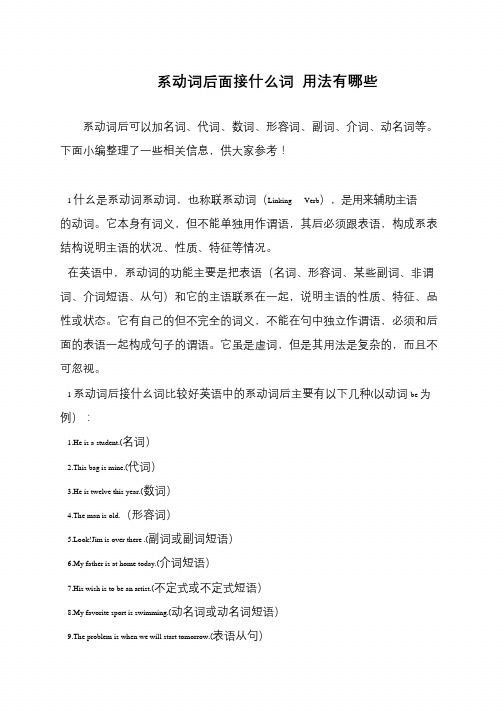
系动词后面接什么词用法有哪些
系动词后可以加名词、代词、数词、形容词、副词、介词、动名词等。
下面小编整理了一些相关信息,供大家参考!
1 什幺是系动词系动词,也称联系动词(Linking Verb),是用来辅助主语的动词。
它本身有词义,但不能单独用作谓语,其后必须跟表语,构成系表结构说明主语的状况、性质、特征等情况。
在英语中,系动词的功能主要是把表语(名词、形容词、某些副词、非谓词、介词短语、从句)和它的主语联系在一起,说明主语的性质、特征、品性或状态。
它有自己的但不完全的词义,不能在句中独立作谓语,必须和后面的表语一起构成句子的谓语。
它虽是虚词,但是其用法是复杂的,而且不可忽视。
1 系动词后接什幺词比较好英语中的系动词后主要有以下几种(以动词be 为例):
1.He is a student.(名词)
2.This bag is mine.(代词)
3.He is twelve this year.(数词)
4.The man is old.(形容词)
5.Look!Jim is over there .(副词或副词短语)
6.My father is at home today.(介词短语)
7.His wish is to be an artist.(不定式或不定式短语)
8.My favorite sport is swimming.(动名词或动名词短语)
9.The problem is when we will start tomorrow.(表语从句)。
英语系动词详细用法汇总

英语系动词详细用法汇总
英语中的动词有很多种用法,下面是一些常见的动词用法汇总:
1. 及物动词:动作作用于一个宾语,例如:eat(吃)、drink (喝)、write(写)等。
2. 不及物动词:动作不作用于一个宾语,例如:run(跑)、sleep (睡觉)、cry(哭)等。
3. 双宾语动词:有两个宾语的动词,一个是直接宾语,一个是间接
宾语,例如:give(给)。
4. 及物动词+介词:及物动词后面跟一个介词短语作为宾语,例如:look at(看)、listen to(听)等。
5. 不定式动词:以to+动词原形构成,表示目的、意图或目标,例如:want to go(想去)、try to do(尝试做)等。
6. 动词 + -ing形式:表示正在进行的动作,例如:I am reading (我正在读书)。
7. 动词 + 分词形式:表示被动语态,例如:The book is written by him(这本书是他写的)。
8. 动词 + 副词/介词短语:表示动作的方式、时间、地点等,例如:run quickly(快速跑)、go to school(去学校)等。
9. 动词 + 名词:表示动作的对象或结果,例如:drink water(喝水)、play football(踢足球)等。
10. 动词的时态变化:包括一般现在时(present simple)、一般过去时(past simple)、现在进行时(present continuous)、过去进行时(past continuous)等。
- 1、下载文档前请自行甄别文档内容的完整性,平台不提供额外的编辑、内容补充、找答案等附加服务。
- 2、"仅部分预览"的文档,不可在线预览部分如存在完整性等问题,可反馈申请退款(可完整预览的文档不适用该条件!)。
- 3、如文档侵犯您的权益,请联系客服反馈,我们会尽快为您处理(人工客服工作时间:9:00-18:30)。
系动词系动词亦称联系动词(Link Verb),作为系动词,它本身有词义,但不能单独用作谓语,后边必须跟表语(亦称补语),构成系表结构说明主语的状况、性质、特征等情况。
系动词的分类:1)状态系动词用来表示主语状态,只有be一词,例如:He is a teacher.他是一名教师。
(is与补足语一起说明主语的身份。
)2)持续系动词用来表示主语继续或保持一种状况或态度,主要有keep, rest, remain, stay, lie, stand, 例如:He always kept silent at meeting.他开会时总保持沉默。
This matter rests a mystery.此事仍是一个谜。
3)表像系动词用来表示"看起来像"这一概念,主要有seem, appear, look, 例如:He looks tired.他看起来很累。
He seems (to be) very sad.他看起来很伤心。
4)感官系动词感官系动词主要有feel, smell, sound, taste, 例如:This kind of cloth feels very soft.这种布手感很软。
This flower smells very sweet.这朵花闻起来很香。
5)变化系动词这些系动词表示主语变成什么样,变化系动词主要有become, grow, turn, fall, get, go, come, run.例如:He became mad after that.自那之后,他疯了。
She grew rich within a short time.她没多长时间就富了。
6)终止系动词表示主语已终止动作,主要有prove, trun out, 表达"证实","变成"之意,例如:The rumor proved false.这谣言证实有假。
The search proved difficult.搜查证实很难。
His plan turned out a success.他的计划终于成功了。
(turn out表终止性结果)各类系动词用法:be动词用法be + adjHe is tall. 他长的高。
She is angry. 她生气。
The cat is black. 这只猫是黑色的。
be + adv.(又可作为介词的部分副词)My parents are in. 我的父母在家。
(in在此为副词)。
The new album is not out yet. 新专辑还没发布呢。
Sales are up. 销售量上升了。
be + n.Jane is a student. 简是一名学生。
Life is an art. 生活是一种艺术。
Guangzhou is a big city. 广州是个大城市。
(big修饰city,核心词是名词city)be + v-ingHis favorite sport is playing basketball. 他最喜欢的运动是打篮球。
Your job is taking care of the baby. 你的工作是照顾好婴儿。
Her hobby is teaching. 她的爱好是教书。
【注意】此结构不是表示进行时态。
请对比:His favorite sport is playing basketball. 他最喜欢的运动是打篮球。
(表示最喜欢的运动是什么;playing是动名词作名词用)He is playing basketball. 他正在打篮球。
(正在进行时,表示他正在进行的动作;playing是表示正在进行的动作)Her hobby is reading. 她的爱好是阅读。
(reading是动名词作名词用)She was reading. 她在读书。
(进行时;reading是现在分词表示正在进行的动作)be +作形容词用的过去分词The door is closed. 门是关着的。
The glass is broken. 玻璃碎了。
He is tired. 他累了。
【注意】此结构不是表示被动。
请对比:The door is closed. 门是关着的。
(强调状态;closed是作形容词用)The door is closed by Tom. 门被汤姆关了。
(被动语态,强调动作)She was exhausted. 她筋疲力尽了。
(强调状态;exhausted是作形容词用)She was exhausted by the long walk. 长途步行让她筋疲力尽。
(被动语态,强调动作)be +介词短语The mirror is on the wall. 镜子在墙上。
The teacher is in the classroom. 老师在教室里。
The cat is under the table. 猫在桌子下面。
be +to doMy dream is to open a company of my own. 我的梦想是开一家自己的公司。
Your job is to solve the problem. 你要做的就是解决这个问题。
My advice is to stop complaining. 我的建议是:停止抱怨。
keep 用法keep+ adjWe sat around the fire to keep warm. 我们围着火坐以求保暖。
You must keep calm. 你必须保持冷静。
The patient kept sane. 病人仍然神志正常。
Keep still. 别动。
keep+ 介词短语Let’s keep in touch. 我们保持联系。
It's none of your business. You keep out of this. 这不关你的事,你别掺和进来。
You have to keep in line. 你必须排队。
stay 用法stay+ adjEat right to stay healthy. 正确饮食,保持健康。
She stayed awake all night. 她整晚没睡。
Stay silent and stay calm. 保持安静和保持冷静。
stay+ n.They stayed friends throughout their lives. 他们一生都是朋友。
Stay a student all your life. 一生做个学生。
(学无止境)He is willing to stay a worker. 他乐意继续做工人。
stay+ 介词短语Stay out of trouble. 别惹事。
Stay away from me! 别靠近我!They stayed in touch for years. 他们保持联系好几年了。
look 的用法用于非正式场合,侧重从人或物外表视觉得出的印象look+ adjYou look very tired. 你看起来很累。
He looks sad. 他看起来悲伤。
She doesn't look happy. 她看起来不高兴。
look+ n.She looks (like) a good girl. 她看起来是个好女孩。
He looks (like) an honest man. 他看起来是个诚实的人。
It looks+ as if/though引导的从句It looks as if/though the meeting is over. 会议好像结束了。
It looks as if/though he is ill. 他好像病了。
It looks as if/though it might snow. 好像要下雪了。
look like 好像It looks like it will not snow. 好像不会下雪。
It looks like she is going to win the competition. 好像她会赢得这场比赛。
It looks like he is not going to come. 好像他不会来了。
appear 用法常用于正式文体中,侧重表面印象,有时含有实质上并非如此之意。
appear+ adjHe appeared upset. 他看起来心烦。
She appeared pleased. 她看起来挺高兴。
Although everything appears normal, something is wrong. 虽然所有事表面上看起来正常,但是有些不对劲。
appear+ n.She appears a fool. 她看起来像个傻瓜。
He appears a different man. 他看起来像变了个人。
It appears a good deal. 这好像是个不错的交易。
appear+ to+ v.He appeared to be a calm man. 他好像是个冷静的人。
Her mother appeared to be angry. 她母亲好像生气了。
They appeared to have a good time. 他们好像玩的高兴。
He appears to know what happened. 他好像知道发生了什么事。
seem 用法seem指说话人内心的估计与判断seem+ adjHe seemed very happy. 他似乎很开心。
The request seems reasonable. 这要求好像合理。
The meeting seems important. 这会议好像重要。
Your story seems true. 你说的好像是真的。
seem+ n.This seems (like) a good idea. 这好像是个好主意。
It seems (like) a smart decision. 这好像是个明智的决定。
He seems (like) a nice man. 他好像是个不错的人。
seem+ to+ v.The movie seems to be funny. 这电影好像挺搞笑。
She seems to be a nice girl. 她好像是个挺不错的女孩子。
He seemed to know my secret. 他似乎知道我的秘密。
She doesn’t seem to remember what happened. 她好像不记得发生了什么事。
It seems + as if/though引导的从句It seemed as if/though the work would never end. 工作好像永远都做不完。
